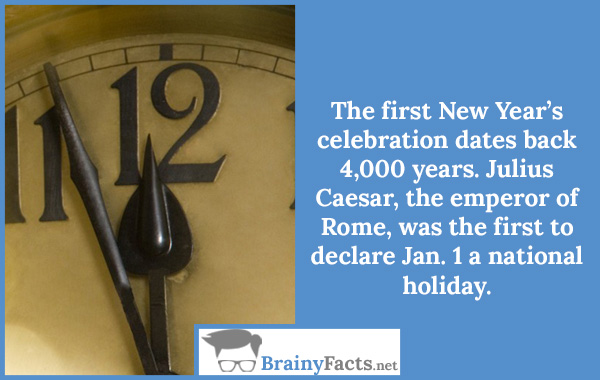12 Facts You Never Knew About New Year’s
Longplayer
Composer Jem Finer wrote the piece called “Longplayer,” which can be heard at London’s Trinity Buoy Wharf (or over this live stream). It’s being performed by singing bowls and is set to start all over again immediately after it finishes in 2999.
Wishfetti
Confetti may not be a new concept, but in 2015 “wishfetti” became a part of the tradition. People write their wishes for the new year and submit them to the Wish Wall in Times Square (or online) and those wishes are turned into the confetti that falls over the crowd at midnight.
The New Year’s kiss
Although things got a little friskier back then, ancient Romans are credited with the kissing tradition because of their Saturnalia festival. It was a celebration honoring Saturn, the god of time, where all social norms went out the window. Many of the celebrations influenced the Christmas and New Year’s festivities that became the focus when Christianity took over the Roman Empire.
Bad Luck Foods
Lobster and chicken are both considered bad luck foods. According to superstition, if because of a lobster’s ability to move backward and a chicken’s ability to scratch itself backwards, if you eat either on New Year’s, you won’t be able to move forward.
Bring good luck
Among Americans of German descent, jelly donuts have long been thought to bring good luck to those who eat them on New Year’s Eve.
Ancient New Year party
The ancient Hawaiian New Year was four months long, war was forbidden, people stopped working, and the people spent time dancing, feasting and having a good time.
Fresh Start
The most common New Year resolutions include ‘quit smoking’, ‘lose weight’, ‘stay healthy and fit’, ‘save more money’ and ‘get (more) organized’.
Celebrate New Year!
New Year celebrations are not new. The concept actually dates back to 2000 BC. The Mesopotamians used to celebrate New Year!
Janus
The month of January derives its name from a two-faced God named Janus. Janus’ one face looked forward while the other looked backward.
First celebration
The first New Year’s celebration dates back 4,000 years. Julius Caesar, the emperor of Rome, was the first to declare Jan. 1 a national holiday. He named the month after Janus, the Roman god of doors and gates. Janus had two faces, one looking forward and one looking back. Caesar felt that a month named after this god would be fitting.
Auld Lang Syne
The traditional New Year’s song, “Auld Lang Syne,” means, “times gone by.”
In Italy
In Italy, people wear red underwear on New Year’s Day to bring good luck all year long.











